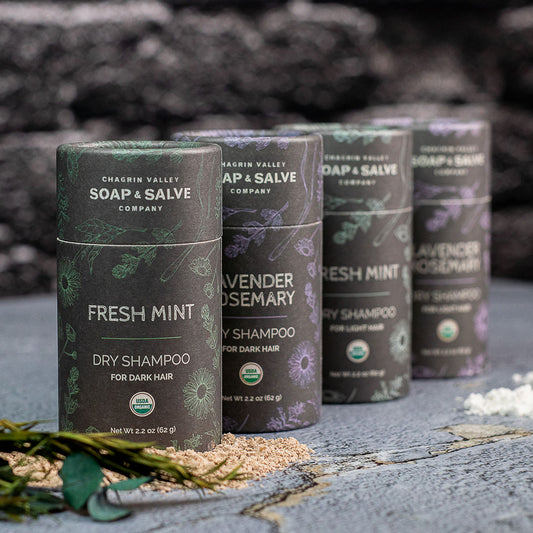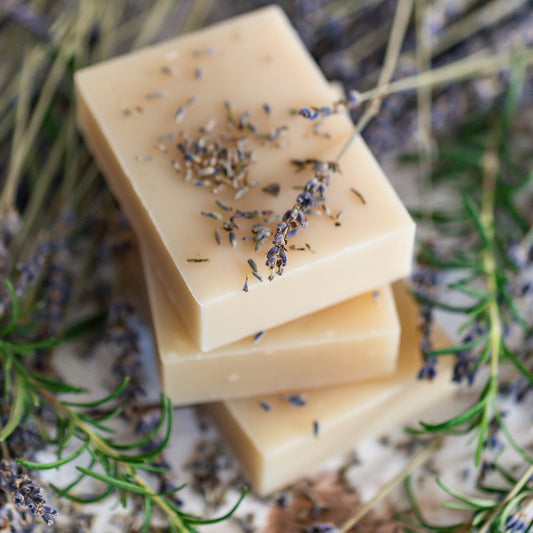Dry Shampoo Recall:
Not All Dry Shampoos Are Created Equal!
Over the past few months, my email box has been inundated with links to articles about the dry shampoo recall and emails from customers with questions or comments about our dry shampoos.
 So, I thought I would try and shed some light on the dry shampoo recall as well as offer the best alternative!
So, I thought I would try and shed some light on the dry shampoo recall as well as offer the best alternative!
Why the Dry Shampoo Recall?
The recall is due to the discovery of elevated levels of benzene in some dry shampoo products.
It is interesting to note that this is not the first time benzene contamination prompted a recall of personal care products in recent history. According to an article from NPR written in December 2021:
“Procter & Gamble has recalled 32 of its dry shampoo and conditioner products after detecting benzene, a known carcinogen, in some of them.” (source)
The FDA also reported elevated benzene levels found in aerosol antiperspirants and deodorants tested from 30 different brands well as sunscreen, and even children’s hand sanitizer.
In mid-October 2022 the U.S. Food and Drug Administration (FDA) announced a nationwide dry shampoo recall by Unilever due to “elevated levels of benzene” in dozens of aerosol products. They also released a list of numerous other dry shampoo products that contain benzene. According to the FDA:
“Unilever United States today issued a voluntary product recall to the consumer . . . of dry shampoo aerosol products produced prior to October 2021 . . . due to potentially elevated levels of benzene."
"Benzene is classified as a human carcinogen. Exposure to benzene can occur by inhalation, orally, and through the skin and it can result in cancers including leukemia and blood cancer of the bone marrow and blood disorders which can be life threatening."
"Consumers should stop using the affected aerosol dry shampoo products and visit UnileverRecall for instructions on how to receive reimbursement for eligible products.”
What is Benzene?
 Benzene is a chemical that is liquid at room temperature. It is highly flammable and evaporates into the air very quickly.
Benzene is a chemical that is liquid at room temperature. It is highly flammable and evaporates into the air very quickly.
According to the US Centers for Disease Control and Prevention, benzene is formed from both natural and man-made processes. “Natural sources of benzene include volcanoes and forest fires. Benzene is also a natural part of crude oil, gasoline, and cigarette smoke.”
Benzene is widely used in the United States often to make other chemicals that are used to make plastics, resins, nylon, and synthetic fibers. Benzene is also used to make some types of lubricants, rubbers, dyes, detergents, drugs, and pesticides.
In recent years, benzene has been detected in numerous personal care products, with most being aerosols.
Benzene is not a an ingredient in dry shampoos and has no role in absorbing hair oils or masking odors. Benzene seems to be an unintended contaminant of dry shampoo, inadvertently introduced into products during the manufacturing process. Since benzene often adheres to butane, a propellant used in aerosols, it is most likely that the aerosol propellants may be responsible for the benzene contamination.
Is Benzene Dangerous?
Benzene is a chemical carcinogen that works by interfering with normal cell activity. The major effect of long-term exposure is on the blood. For example, it can cause bone marrow not to produce enough red blood cells, which can lead to anemia. “Exposure to benzene increases the risk of developing leukemia and other blood disorders,” according to the National Cancer Institute.
According to the CDC, “The seriousness of poisoning caused by benzene depends on the amount, route, and length of time of exposure, as well as the age and preexisting medical condition of the exposed person.”
Research has shown benzene to be carcinogenic in high concentrations. However, people breathe in low levels of the compound every day. According to the FDA:
"Benzene is ubiquitous in the environment. Humans around the world have daily exposures to it indoors and outdoors from multiple sources."
Since it is not possible to avoid benzene exposure in everyday life why add even more in our personal care products?
As it seems with every potentially toxic chemical, we have no idea how long-term exposure to "acceptable" small levels of benzene will affect our health over time. What happens when I breathe in or use the “acceptable amounts” every day for 60 years?
The benzene in aerosol cans of dry shampoo is of particular concern since you literally spray the product around your nose, mouth, and eyes in a small enclosed space like a bathroom.
What Are the Alternatives to Dry Shampoo With Benzene?
Not All Dry Shampoos Are Created Equal!
 Commercial dry shampoos come in either powder or aerosol form.
Commercial dry shampoos come in either powder or aerosol form.
If you are concerned about benzene exposure, definitely stay away from aerosol products.
Furthermore, I suggest that you choose a dry shampoo that supports a healthy scalp and absorbs oil with natural, clean, simple ingredients.
While all dry shampoos probably work to soak up excess oil, what about the ingredients? Are they really natural?
Read the ingredients! Many of the articles about the recall suggested safer dry shampoo alternatives. I have spent the last few weeks researching the ingredients in many of these brands. While most contained a variety of natural ingredients like starches and/or clays, many also contained a number of synthetic ingredients like:
- Fragrance (Parfum)
- Cetrimonium Chloride,
- Polysilicone-22
- Benzyl Salicylate
- Butylphenyl Methylpropional
- Isodecyl neopentanoate
- Dimethicone
Artificial fragrances and other synthetic ingredients can be scalp irritants for some. All of those irritants may contribute to long-term problems and an unhealthy scalp.
While the ingredients in a regular shampoo are rinsed away when you wash your hair, dry shampoo ingredients may remain on your scalp for days. Is this a problem? Who knows! But why bother with a chemical-laden dry shampoo when there are natural options?
My Alternative Suggestion
Surprise, surprise! Chagrin Valley makes awesome USDA Certified Organic powdered dry shampoos.
A few weeks ago we received an email from a customer.
"I've been a customer for a few years, but never tried your dry shampoo. Been using the same one for years and now it got recalled. Thought of you guys and ordered the dark hair mint flavor. I really didn’t expect much but it is the best dry shampoo I have ever used. Never thought a product with so few ingredients could work so well. Guess I learned a lesson."
We believe that Mother Earth supplies us with everything we need to formulate wholesome, high-quality, effective handmade products. Lesson learned -- those extra synthetic ingredients are not needed!
Learn More Blog: What is Dry Shampoo?






